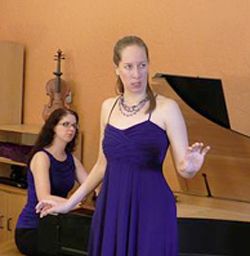by Daniel Hathaway

The program centers around the idea that music transcends the personal traits of its creators — that whether composers were virtuous in their private lives like Henry Purcell (who was still capable of writing scatalogical rounds) or Tarquinio Merula, who was apparently a difficult employee and was censured for “indecency manifested towards several of his pupils,” their music “remains exquisite enough to stand the test of time,” as Maust writes in her program notes.
The program begins with the good guys: Purcell’s If music be the food of love, and French cello virtuoso Jean Barrière’s Sonata in c minor from his second book of sonatas, composed between 1733 and 1739. Barrière escapes close personal scrutiny because little is known about his life, which “seems to have been quite ordinary,” Maust says, adding that Barrière was the first to compose entirely idiomatic cello music during the first half of the 18th century.
Merula is a different story, having moved between jobs frequently as disputes and disagreements arose. Rauschenfels will sing two songs from his 1638 collection, Curtio precipitate et altri capricii, libro secondo. The first is a “little ditty” about the singer’s beloved (who is the source of both ardor and torment), the second a lullaby sung by Mary to Jesus that predicts his suffering and death.
18th century gambist Jean-Baptiste Forqueray ran afoul of the authorities but apparently through no fault of his own other than professional jealousy on the part of his father, who had him imprisoned and banished. The sentence was later revoked and Forqueray returned to France to enjoy a career as a performer and music publisher. Maust will play harpsichord transcriptions of two of his 1747 Pièces de viole avec la basse continuë.
Alessandro Stradella’s personal life was besmirched by some shady marriage brokerage dealings, and his assassination, presumably by a resentful colleague, though the case remains open. His cantata Ferma il corso e torna al lido, which Maust notes is characterized by “extreme register changes, extensive chromaticism, evaded cadences, and bass lines that are often as interesting and florid as the vocal line,” tells the tale of Arianna on Naxos, a story that would later captivate Richard Strauss.
Paula Maust, who is currently pursuing a master’s in harpsichord at Peabody in Baltimore, and Malina Rauschenfels, a Julliard graduate in cello who has just finished recording the first half of a CD, have already performed this program in Baltimore and Pittsburgh, are looking forward to bringing it to two very different spaces in Cleveland.
“St. Albans is very intimate, and Mary Queen of Peace is vast,” Rauschenfels said in a Skype conversation. But in each case, the soprano will no doubt break the fourth wall and venture out into the audience as she has in past performances, to make more of a direct contact with her listeners.
Rauschenfels enjoys that interaction, which will probably be even more striking in May when Burning River Baroque returns to present “On the Brink of Insanity: Portrayals of Women as Mad, Crazy, and Unhinged” with guest cellist Barbara Krumdieck.
Published on ClevelandClassical.com January 19, 2016.
Click here for a printable copy of this article



